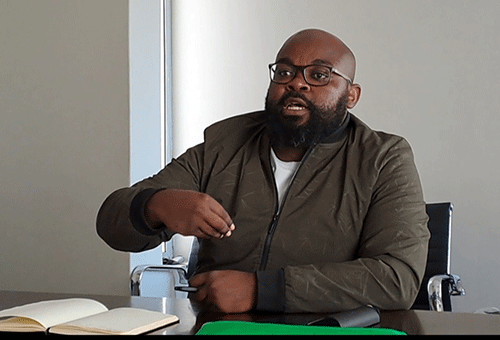In the face of widespread poverty and ongoing drought, Kunene governor Marius Sheya has highlighted the urgent need for unity and strongly criticised the resurgence of tribalism, which he said is impeding regional progress.
He also acknowledged that achieving socio economic transformation requires joint
efforts and called upon political, community, religious and traditional leaders to foster unity in their respective positions.
He made the comments at a time when the region is facing multiple challenges that have widely been attributed to prevalent tribalism in the area.
During yesterday’s State of the Region address (Sora), Sheya expressed concern that tribalism was once again becoming a disruptive factor and urged all leaders to set a positive example, promote unity, and facilitate regional growth.
Drought
In 2019, President Hage Geingob declared a State of Emergency in response to severe drought devastating Kunene.
During his Sora, Sheya said: “Climate change is directly responsible for this drought, which has inflicted immense suffering by stripping our people of their means of survival and exacerbating poverty and hunger”.
He noted that since 2019, more than 35 000 Kunene households in rural areas have been identified as having been impacted by the crisis. Subsequently, government supplied
vital food provisions to both affected households and their livestock.
Sheya remarked that the Drought Mitigation Programme has been consistently implemented, including for the 2022/23 financial year. In addition, given the ongoing and persistent drought conditions in the region, Sheya said government has decided to extend the drought relief programme for the 2023/2024 financial year.
He added that insufficient
availability of vehicles hampers the smooth movement of drought aid supplies to affected areas, causing unnecessary delays in reaching households in need.
In addition, the region’s
deteriorating road conditions pose additional obstacles, making it
particularly challenging for vehicles to
navigate effectively.
Development
During the 2022/23 financial year, the Kunene region received over N$200 million. However, just under N$34 million was utilised from this allocation due to the virement of funds for specific projects.
Local authorities
Sheya also highlighted the achievements and projects undertaken by local authorities in the region: The Kamanjab local authority invested in infrastructure upgrades, including road improvements, water reticulation, and affordable housing. They also supported small and medium-sized enterprises and focused on sanitation infrastructure development.
The Khorixas Town Council prioritised essential services, such as sewer upgrades, clean water access, and road maintenance. These initiatives created job opportunities and improved public health and environmental sustainability. The Outjo Municipality focused on expanding residential areas, with subdivision projects and the establishment of new townships to address housing demand.
Meanwhile, Opuwo Town Council constructed water and sewerage systems for 100 erven owned by DW Namibia, at a cost of N$3 700 000. Opuwo is also currently involved in a bulk infrastructure development project, to the tune of N$9 million, to revamp oxidation ponds and provide bulk water to Otuzemba Ext 3. Gravel road maintenance in front of Opuwo Central Park has also been completed at a cost of just over N$900 000. The council is also in the process of constructing a yard for Opuwo Central Park, and the ongoing relocation of the Opuwo Sport facility is underway.
Education
The governor further highlighted a series of crucial projects undertaken by the directorate of education, aimed at improving education and infrastructure in the region.
The region has so far spent more than N$130 million on the completion of specific projects such as the upgrading of Basic Education Facilities (BEF), renovation of Mureti Secondary School, construction at Otuzemba Primary School and additional facilities for Omuhonga Primary School, among many others.
Health
Meanwhile, the region has also embarked on key projects including clinic renovations, staff accommodation, electrical repairs, and equipment installation. Many of these projects have been completed while some are still ongoing.
Completed projects include minor
renovations at clinics and staff houses, electrical renovations at hospitals, supply and installation of surgical equipment, and repair of infrastructure such as fences and parking areas. Ongoing projects include the renovation of district hospitals, installation of water reservoir tanks and repairs to maternity wards and incinerators.
“The directorate continues to prioritise the enhancement of health infrastructure to meet the growing healthcare needs of the community,” Sheya mentioned.
Agriculture
He further emphasised a persistent reliance of Kunene residents on rain-fed agriculture, particularly those involved in livestock farming. To ensure the protection of livelihoods, enhance animal health and promote animal identification, the Directorate of Veterinary Service (DVS), under the agriculture ministry, has launched several significant initiatives. One such aspect is the Livestock Support Programme, which has received an allocation of N$15 200 000.
The ongoing project has utilised N$100 000 to train farmers and staff members, as well as procure ear tags and a vehicle.
“The DVS is committed to revitalising the local livestock economy by upgrading the Opuwo slaughterhouse into an abattoir. However, progress has been hindered by the slaughterhouse’s outstanding electrical and water debt,” he said. To overcome this obstacle, he recommends collaborative action involving the Opuwo Town Council, Nored, Namibia Red Cross Society and the Kunene Regional Council. Other projects valued at N$1 million include the construction of seven toilets, sewerage services, gravity sewer networks, and the rehabilitation of a sewer pump station in Fransfontein. Sheya said phase 2B of the project, which aims to build 74 toilets, is currently underway. Furthermore, the construction of the Okanguati settlement office is in progress, with a budget allocation of N$3 million. – ashikololo@nepc.com.na



